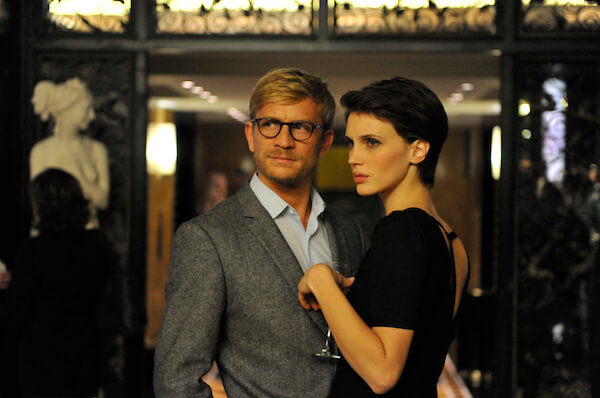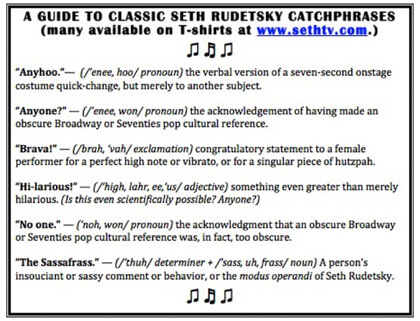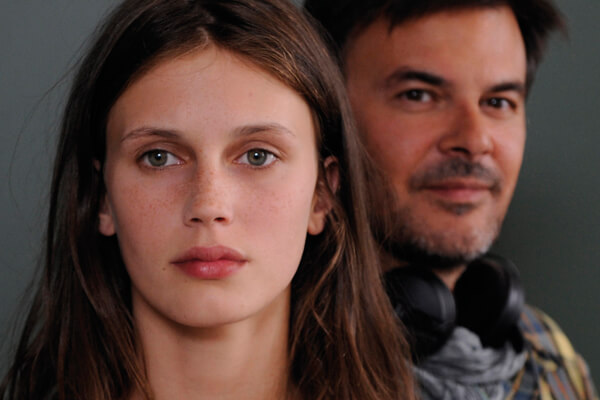John Lloyd Young at the Café Carlyle. | COURTESY: O+M CO.
It’s freezing outside, but mighty warm in the various boites around town where I enjoyed an extraordinary bounty of great music in the last weeks. Two Tony winners, John Lloyd Young (“Jersey Boys”) and Jennifer Holliday (“Dreamgirls”) made what amounted to triumphant comebacks, thrilling their audiences with talent that seems to have only grown in their years of absence from the New York stage.
At Café Carlyle (Feb. 12), with his honeyed tenor and soaring falsetto, Young performed his favorite pop selections from the 1950s and ‘60s, calling such songs many (some?) of us grew up with — like “Since I Fell for You,” “How Can I Be Sure?” “Hey There Lonely Girl,” “Hurt So Bad,” and “Only You” —musical comfort food. They surely were that, as goose bumps of anticipation formed with their familiar opening chords and the room became positively awash in nostalgic endorphins. He opened with “Can’t Take My Eyes Off You” from his Tony vehicle, but my favorite was a cover of Al Wilson’s “Show and Tell” that totally showed off his soulful chops, accompanied by an ace band that had a generous string section.
Young admitted he’d been camped out in Los Angeles, singing for various benefits and private parties, getting his kung fu black belt, and creating some quite profitable art by covering ordinary objects with rhinestones. He recalled first moving to New York to an apartment without decent heating, causing him to wear underwear on his head for warmth, and added he told this story on the advice of his “Jersey Boys” book writers, Marshall Brickman and Rick Elice. They said that if he humiliated himself early in his performance, he’d win the audience over.
Cabaret delights; powder this farce; Adjani: great actress or just a beauty?
Jennifer Holliday and David Noh. | COURTESY: DAVID NOH
On Valentine’s Day, the atomic vocal power of Jennifer Holliday almost blasted a hole in the ceiling of the tiny Iridium Jazz Club. Looking like she hasn’t aged a day since her 1982 Tony win, her set of standards was glowingly blessed by her complete lyric involvement, crystalline diction, and high-flying musicality. She sang three hoary chestnuts in a row, and totally made them her own — “My Funny Valentine,” a deliriously good “At Last” (which made me wonder why the pallid-by-comparison Beyoncé, and not her, was chosen to sing this at the 2009 Obama inaugural ball), and — mentioning that Judy Garland’s was her favorite version — “Come Rain or Shine,” which she ended with a searingly funky repeat of the words “with you” that brought the audience to their feet.
Her band, consisting of the most stunningly talented and handsome black men (with a token whitey on keyboard), was magnificent, and a big part of the evening’s enjoyment was watching their own awestruck enjoyment of their star. Holliday’s demeanor throughout was singularly humble, from her modest entrance to the heartfelt “thank you’s” she murmured after every ovation. She mentioned how happy she was to be back singing and how it all now makes so much more sense to her.
“I get asked all the time if I ever get tired of singing the song I’m best known for,” she said. “And I have to say I don’t. Because so many other people have done it since me, I feel it belongs to all of us.”
And with that, she took a barely perceptible breath and started “And I am Telling You,” stamping it with every gloriously familiar, overwrought melisma and mannerism that has made this the ultimate modern torch song. Garland had “The Man That Got Away,” but Holliday will forever have this one, and, no matter how many times you’ve heard it before from either her or certain other people with her same initials and first name who happened to win an Oscar for it, Holliday’s remains the touchstone. Forever. Because she still, miraculously, seems to be able to sing it like no other every single time she does it. To put it bluntly, when she sings it, she bleeds.
Lulu’s New York debut gig at B.B. King’s (Feb. 16) was jam-packed, people standing four deep at the bar, and they didn’t even seem to all be Brits! She hit the stage, pistols blaring, looking about 25, and launched into “Unchain My Heart,” the first of a string of down-and-dirty R&B standards that had the house rocking. Another superb band supported her, terrifically led by Paul Shaffer, in his absolute element, jamming away. Screwing up her song order at one point, she said, “I’m 64!” You’d never fucking believe it.
Natalie Charlé Ellis, Scott Richard Foster, Lindsay Nicole Chambers, and Marcus Stevens in “Forbidden Broadway: Alive and Kicking.” | CAROL ROSEGG
The real musical wonder of wonders is how Gerard Alessandrini manages to consistently find such incredible vocal talent for his editions of “Forbidden Broadway” (47th Street Theatre, 304 W. 47th St.; forbiddenbroadway.com). Especially since, as one of the cast members mentioned, the audition process is grueling, requiring about 30 impressions, with Norm Lewises but no Carol Channings in the mix. Needing a good laugh with all this ice, I caught the show one more time on February 17, and Natalie Charlé Ellis shone as a coke-snorting Audra McDonald in “Porgy,” a litigious Julie Taymor, and a complete with-attitude-but-no-high-notes Catherine Zeta Jones.
Scott Richard Foster eviscerated Steve Kazee’s self-indulgent showboating angst in “Once” and “Newsies’” Jeremy Jordan’s flashy vocal melismas (nailing a note, he goes, “Yes!”). New cast member Lindsay Nicole Chambers caught Bernadette Peters’ pushy furball-in-throat vocalizing, Elena Roger’s utter vocal lack, and, as Patti LuPone, nearly raped her onstage partner-longtime “love” Mandy Patinkin, played by Marcus Stevens. Making his Off-Broadway debut, Stevens is simple astonishing. His clueless Matthew Broderick, the most unlikely song-and-dance man ever, has now been honed to killer perfection, he’s added more hilarious twitches and creepy scratching to his Stephen Sondheim, and his Mandy, like the man himself, is an utter scream.
I finally caught “Forever Dusty” (Feb. 16) and was impressed by lead/ co-creator Kirsten Holly Smith’s convincing facsimile of La Springfield’s smoky, sensual voice, not to mention all that raccoon eyeliner and Lady Bunny hair. It’s a loving tribute, snappily directed by Randal Myler, but suffers from a too thin book that posits Springfield in endless, angrily confrontational scenes with her brother, various music biz types, and black girlfriend (Christina Sajous, as a composite of Dusty’s various lovers). The good news is that Sajous is also generously given time to shine musically, and her sizzling rendition of the Exciters’ fabulous “Tell Him,” the first two notes of which Springfield always cited as an electrifying influence on her, is almost worth the admission price. (Through June 2, New World Stages, 340 W. 50th St.; foreverdusty.com.)
I was one of the bored audience members at the opening night of Tomas Adés’ opera “Powder Her Face” (Feb. 15) who was jolted awake by the sight of 25 butt-naked men prowling the stage around lead soprano Allison Cook. They were uniformly gorgeous (no “Naked Boys Singing” duds here), bespeaking the doubtless hand-picked care that had gone into their casting. I wish the music itself had anything like as much beauty or impact.
The word “masterpiece” keeps getting tossed around in regard to this opera, and I find that wholly unfathomable. “Emperor’s new clothes” is a more fit description to me for all the screeching, caterwauling, and overall random tunelessness of this pastiche. The judge’s aria was particularly excruciating (“Mu-u-u-u-r-DER!”), and I could feel many in the BAM-hip premiere audience just going “Wha?” (apart from one young girl who kept self-consciously laughing, very loudly), but they duly applauded it at the end, with nary a “boo!” one might have heard from the more discerning crowd at the Met.
Grâce à Dieu for Film Society of Lincoln Center’s Rendezvous with French Cinema (Feb. 28 through Mar. 11; filmlinc.com), which annually brings us a trove of Gallic movies that have heart and minds and are about people, not violence, car chases, or goddamn superheroes. Director Claude Miller died last year, but went out in a blaze of glory with his finest work, “Thérèse Desqueyroux” (Mar. 1), a brilliant adaptation of Francois Mauriac’s memorably biting novel about an unhappy haute bourgeoise housewife whose rebellion against her stiflingly cushy existence takes a terrible toll on her husband. Audrey Tautou, who I’ve never been mad about, finally comes through with a fierce, burningly intelligent performance. Her trademark gamine charm seems to have burned off here and, without ever once overdoing it in this very Bette Davis role, you can’t take your eyes off her.
Fabrice Luchini, Kristin Scott, and Ernst Umhauer in François Ozon's “In the House.” | FILMLINC.COM
Gay director François Ozon also delivers his best movie to date with “In the House” (Mar. 1), an irresistibly compelling story about a high school teacher (the great Fabrice Luchini) and his wife (Kristin Scott Thomas) who become unduly caught up with a student who writes fascinating term papers tracking his infiltration into the so-called perfect family of one of his classmates. A fiendishly clever and dead sexy study of voyeurism, it is so well written and cast that you, the viewer, become totally complicit, as well. Side note: Denis Ménochet as the kid’s macho papa may be the hottest actor in the entire festival, maybe all of France — the ultimate Daddy fantasy.
“Renoir” (Mar. 2), Gilles Bourdos’ study of the one Impressionist painter I have always found immensely overrated and precious did nothing to revise my opinion, being a stodgy, pedestrian affair. From the too-new looking cap surmounting the face of Michel Bouquet (giving a tiresome, aphorism-laden great old man performance) to the casting of handsome Vincent Rottiers as his destined-to-be-great filmmaker son, Jean, who was anything but a beauty, there was much to take issue with, although I admired the strength of Christa Theret’s beauty and acting. She played a model, who would eventually marry Jean and become the actress Catherine Hessling, the enchanting star of his “Nana” who died in poverty-stricken obscurity in 1979.
Another French actress, Isabelle Adjani, is being celebrated at BAM with a festival (March 7-21; bam.org). Along with her famous, star-making “The Story of Adele H.,” “Camille Claudel, ” “Queen Margot,” and the legendary disaster “Ishtar,” Andre Téchiné’s rare “The Brontë Sisters” (Mar. 8), with her as Emily, Isabelle Huppert as Anne, and Marie France Pisier as Charlotte, is being shown. Despite the cast, I was disappointed by this. It’s more the story of their tortured brother Branwell (Pascal Greggory), not much better than the Warner Brothers very Hollywood Brontë epic “Devotion” (1946), and never really shows the girls actually writing.
Adjani is a conundrum. Is she really a great actress or is it just her mesmerizing beauty and mystique that make people think so? Téchiné once told me she was far too concerned with her looks, and cited Huppert as the real actress of the two. Garbo had that flawless face, as well, but it was always lit from within by a depth of feeling and sensuality I often find lacking in Adjani, who is more given to express emotions through strenuously flamboyant outbreaks of hysteria. Discuss.
Contact David Noh at Inthenoh@aol.com, follow him on Facebook and Twitter @in_the_noh and check out his blog at http://nohway.wordpress.com/.






































